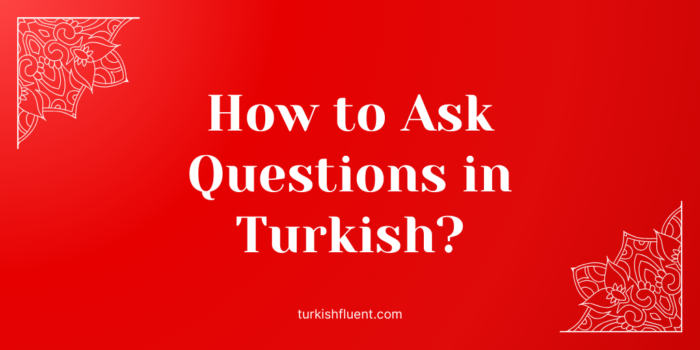In this article, we will cover how to form questions in Turkish. There are two main types of questions: yes-no questions with the -mi suffix and open questions using question words. Last but not least, you can use “değil mi?” to change a statement into a question easily. Hadi başlayalım!
How to Ask Yes-No Questions with the -mi Suffix
To for yes-no questions in Turkish, you must use the -mi suffix placed at the end of the sentence. This suffix allows you to turn a statement into a question.
Note that the suffix -mi changes according to vowel harmony rules, adapting to the last vowel in the verb stem:
- -mi: for words with front vowels (e, i)
- -mı: for words with back vowels (a, ı)
- -mu: for words with back rounded vowels (o, u)
- -mü: for words with front rounded vowels (ö, ü)
Conjugating -mi in the Present, Past, and Future Tenses
For the past and future tenses, the verb is conjugated as usual, and the -mi suffix remains unchanged. In the present tense however, the verb is conjugated in the third person singular of the present continuous, while the -mi suffix is conjugated according to the subject:
- Ben => miyim
- Sen => misin
- O => mi
- Biz => miyiz
- Siz => misiniz
- Onlar => mi
Here is a table giving you examples of how to form questions with the verb “gelmek” and the -mi suffix in the present, past, and future tenses:
| Tense | Pronoun | Question Form | Translation |
|---|---|---|---|
| Present | Ben | Geliyor muyum? | Am I coming? |
| Sen | Geliyor musun? | Are you coming? | |
| O | Geliyor mu? | Is he/she/it coming? | |
| Biz | Geliyor muyuz? | Are we coming? | |
| Siz | Geliyor musunuz? | Are you coming? (plural/formal) | |
| Onlar | Geliyorlar mı? | Are they coming? | |
| Past | Ben | Geldim mi? | Did I come? |
| Sen | Geldin mi? | Did you come? | |
| O | Geldi mi? | Did he/she/it come? | |
| Biz | Geldik mi? | Did we come? | |
| Siz | Geldiniz mi? | Did you come? (plural/formal) | |
| Onlar | Geldiler mi? | Did they come? | |
| Future | Ben | Gelecek miyim? | Will I come? |
| Sen | Gelecek misin? | Will you come? | |
| O | Gelecek mi? | Will he/she/it come? | |
| Biz | Gelecek miyiz? | Will we come? | |
| Siz | Gelecek misiniz? | Will you come? (plural/formal) | |
| Onlar | Gelecekler mi? | Will they come? |
Turn statements into questions with “değil mi?”
Moreover, you can easily turn a statement into a yes-no question adding “değil mi?” at the end of the sentence. “Değil mi?” literally translates to isn’t it/aren’t you in English.
- Statement: Sen her gün parka gidiyorsun. (You go to the park every day.)
- Question: Sen her gün parka gidiyorsun, değil mi? (You go to the park every day, aren’t you)
How to Ask Open Questions in Turkish
For open-ended questions, Turkish has specific question words. Here’s a breakdown of the most essential question words and their meanings in Turkish.
Key Turkish Question Words
- Ne? – What?
- Example: Bu ne? (What is this?)
- Nerede? – Where?
- Example: Kitap nerede? (Where is the book?)
- Nereden? – From where?
- Example: Sen nereden geldin? (Where did you come from?)
- Nereye? – To where?
- Example: Nereye gidiyorsun? (Where are you going?)
- Ne zaman? – When?
- Example: Ne zaman geliyorsun? (When are you coming?)
- Neden? / Niye? – Why?
- Example: Neden buradasın? (Why are you here?)
- Hangi? – Which?
- Example: Hangi kitap senin? (Which book is yours?)
- Hangisi? – Which one?
- Example: Hangisi doğru? (Which one is correct?)
- Kim? – Who?
- Example: Bu kim? (Who is this?)
- Kimin? – Whose (is it)?
- Example: Bu kimin kitabı? (Whose book is this?)
- Kime? – To whom?
- Example: Bu mektup kime? (To whom is this letter?)
- Nasıl? – How?
- Example: Bu nasıl çalışır? (How does this work?)
- Ne kadar? – How much? / How many?
- Example: Bu ne kadar? (How much is this?)
- Ne kadar zaman kaldı? – How long left?
- Example: Sınıfın bitmesine ne kadar zaman kaldı? (How long left until the class ends?)
